By He Yanjun and Hong Yujia
Translated by Wu Hsiao-ting
Photos by Huang Dexin
This breakfast stall owner has an additional role: she also serves as a recycling volunteer and promotes environmental protection among her customers and neighbors. Her role as a guardian of the Earth helps the environment and lights up her life with a vital sense of fulfillment.
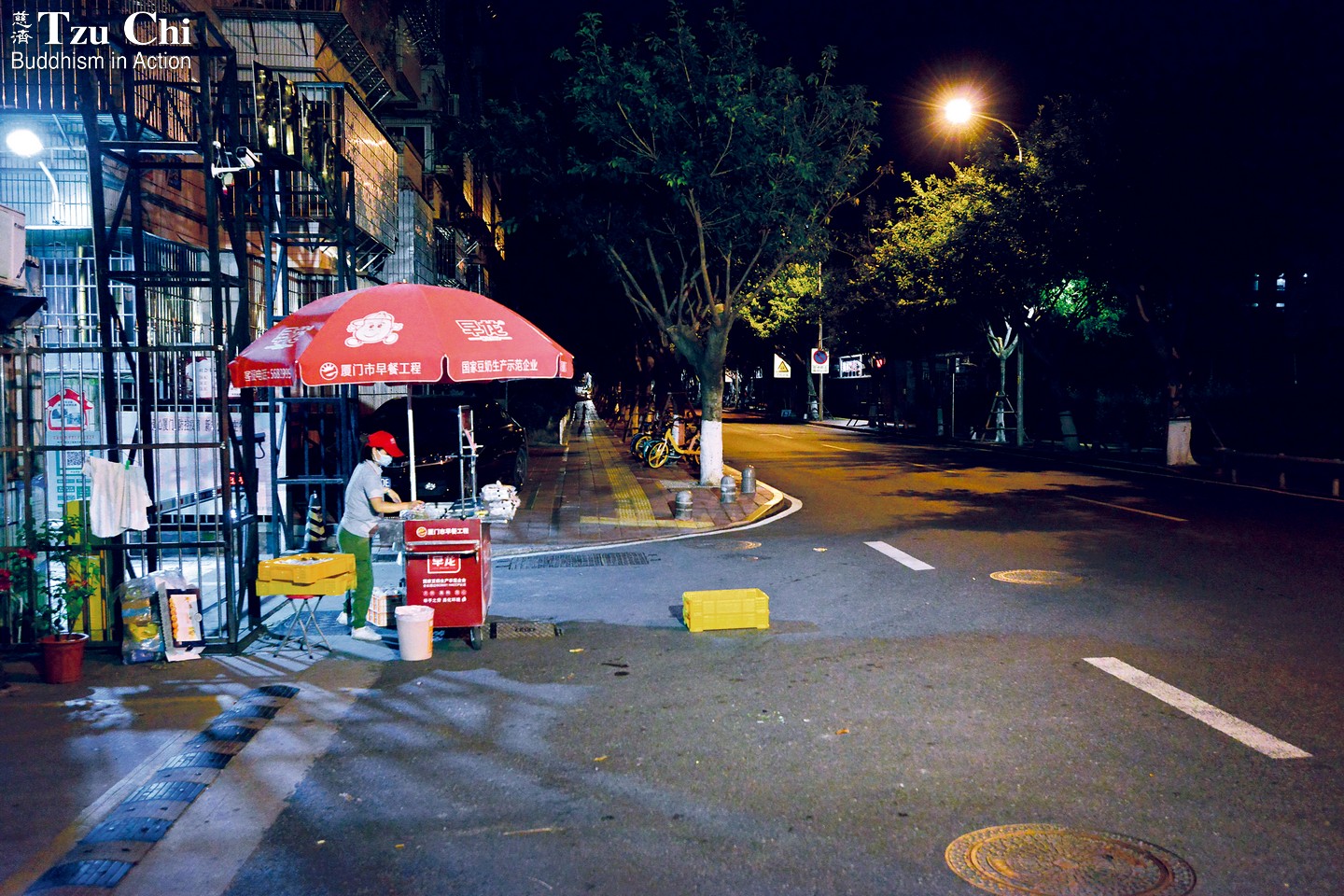
Li Yaping sorts the food items delivered to her breakfast stall in the early hours of the morning. She wants to sort everything as quickly and efficiently as possible so she can to listen to Master Cheng Yen’s Dharma talk at 5:20 a.m.
Li Yaping (李雅平) says she likes sunflowers because of the positive spirit they embody. “The flowers always face the sun and as such bring warmth to people’s hearts,” she said. “The many seeds in the center of their flowers also convey hope and energy.”
A new day has just begun. Li decorates her mobile breakfast stall with a bunch of sunflowers. The golden flowers smile toward the sun, brightening her stall and the hearts of passersby.
Li is from Ningde, Fujian Province, China. She moved by herself 20 years ago to the city of Xiamen, in the southeastern part of Fujian Province, to work. Five years later, she started running a breakfast stall in the city. Every day, rain or shine, she serves residents of the Hetongli community by warming their stomachs with food. Two years ago, her stall started to look different. She began collecting and tying up bundles of waste paper and used bottles and cans that customers dropped off at her stall each day. Though most people would look at such items as garbage, she viewed them as “gifts” from her customers.
Earlier than the bird
It was just 4:30 in the morning. Even the dim streetlights looked sleepy. The sounds of a pushcart traveling across the surface of a road broke the peace of the morning in Hetongli. Li, dressed in a uniform and wearing a red baseball cap, adroitly pushed her breakfast cart to a street corner and parked it in position.
She had some time to spare before 5:00 a.m., when the vehicle delivering the food items to be sold at her stall would arrive. Breaking into a half trot, she headed toward a garbage station in the community. When she arrived, she began her “treasure hunt.” “Some residents here don’t sort their garbage thoroughly,” she said. “If I don’t pick out the recyclables from amidst the garbage, they’ll be taken away and disposed of as regular trash.”
Li reached into a yellow trash can about 1.2 meters (3.9 feet) tall, and began going through the contents. First her head, then her shoulder, then her entire upper body were in the trash can. Before long, the bag in her hand was filled with beverage bottles, plastic cups, and other recyclables.
As soon as she was done with that station, she jogged to another one in a neighboring community and continued her treasure hunt.
Half an hour quickly slipped by. It was about five o’clock, so Li took off her gloves, washed her hands with soap under a faucet, and ran to meet the delivery vehicle. After receiving the goods, she sorted and put them in order at her stall. She went about her task quickly and efficiently. She had to get done by 5:20 so that she could listen to Dharma Master Cheng Yen’s daily Dharma talk via videoconferencing.
When all was set up at her stall, Li took out her cell phone, gave it a few taps, and adjusted its volume before placing it at a suitable angle on her cart. Then she took out her pen and notebook and sat straight before her phone, waiting for the talk to begin.
The sky gradually brightened. The soft sunlight splashed onto the quiet streets in the community. Passersby did a double take when they passed Li’s stall and saw her diligently taking notes while watching her cell phone. Elderly people out for morning exercises and younger workers returning home from their graveyard shifts stopped at her stall and purchased breakfast, their eyes taking in the copious notes she had taken. A few regulars knew that Li was “recharging her battery” again. They asked her, “What did the Master talk about today?” Li enthusiastically shared with them the teachings that had impressed her the most: “The Master said if you just listen to her talks on the Buddha’s teachings without ever putting them into practice, it’s just as good as having never heard them. Putting the Dharma into action and doing our best to give to others is the best way to honor the Buddha.”
The talk came to an end at around 6:30. Li made a 90-degree bow to her teacher on the phone’s screen. This has become a unique yet regular scene in Hetongli.
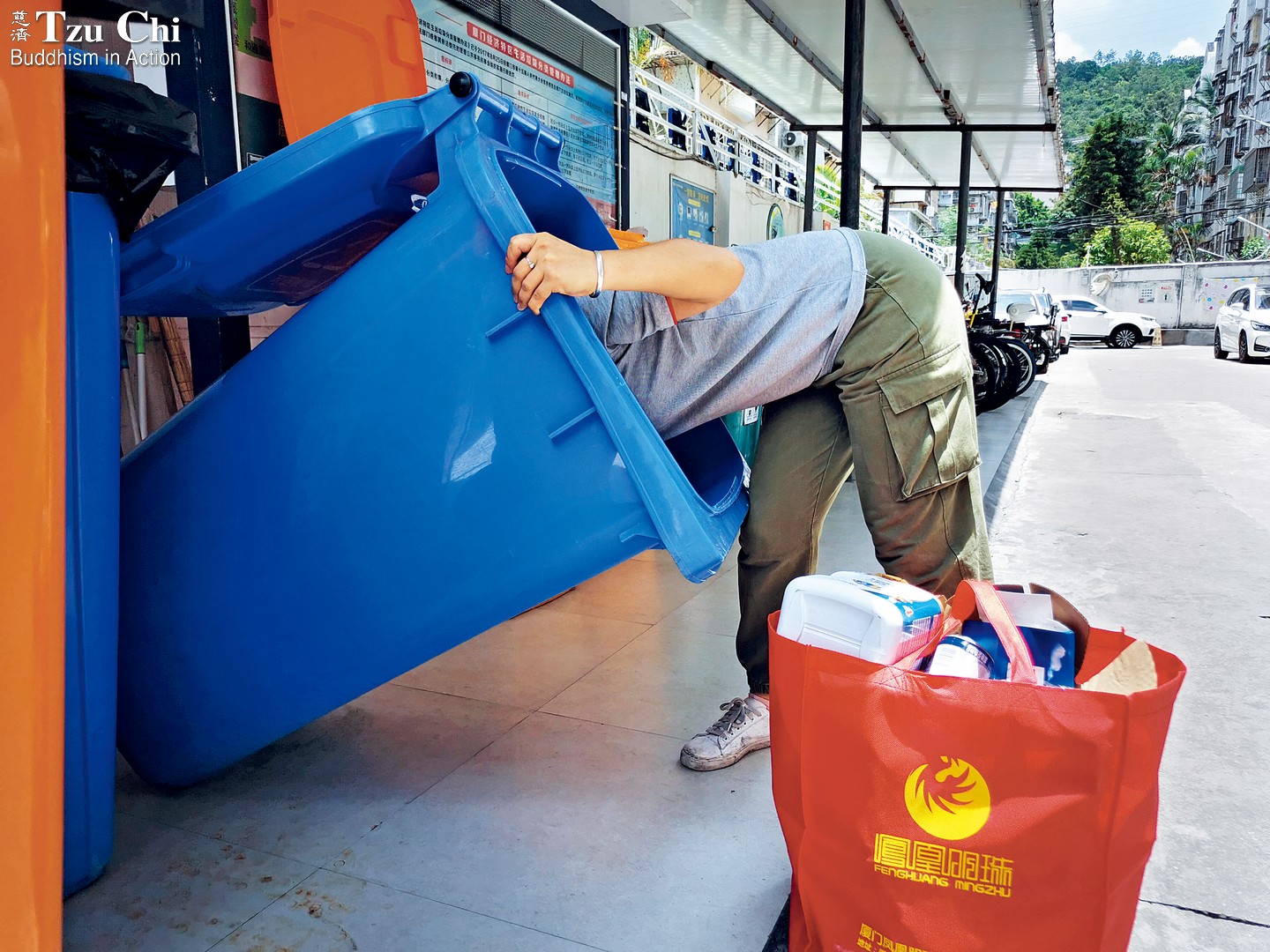
Li rifles through the garbage in a trash can to salvage recyclables. “The work isn’t dirty if you do it with a pure heart,” she said.
Tzu Chi volunteers who live near Li’s breakfast stall cart away recyclables brought by community residents.
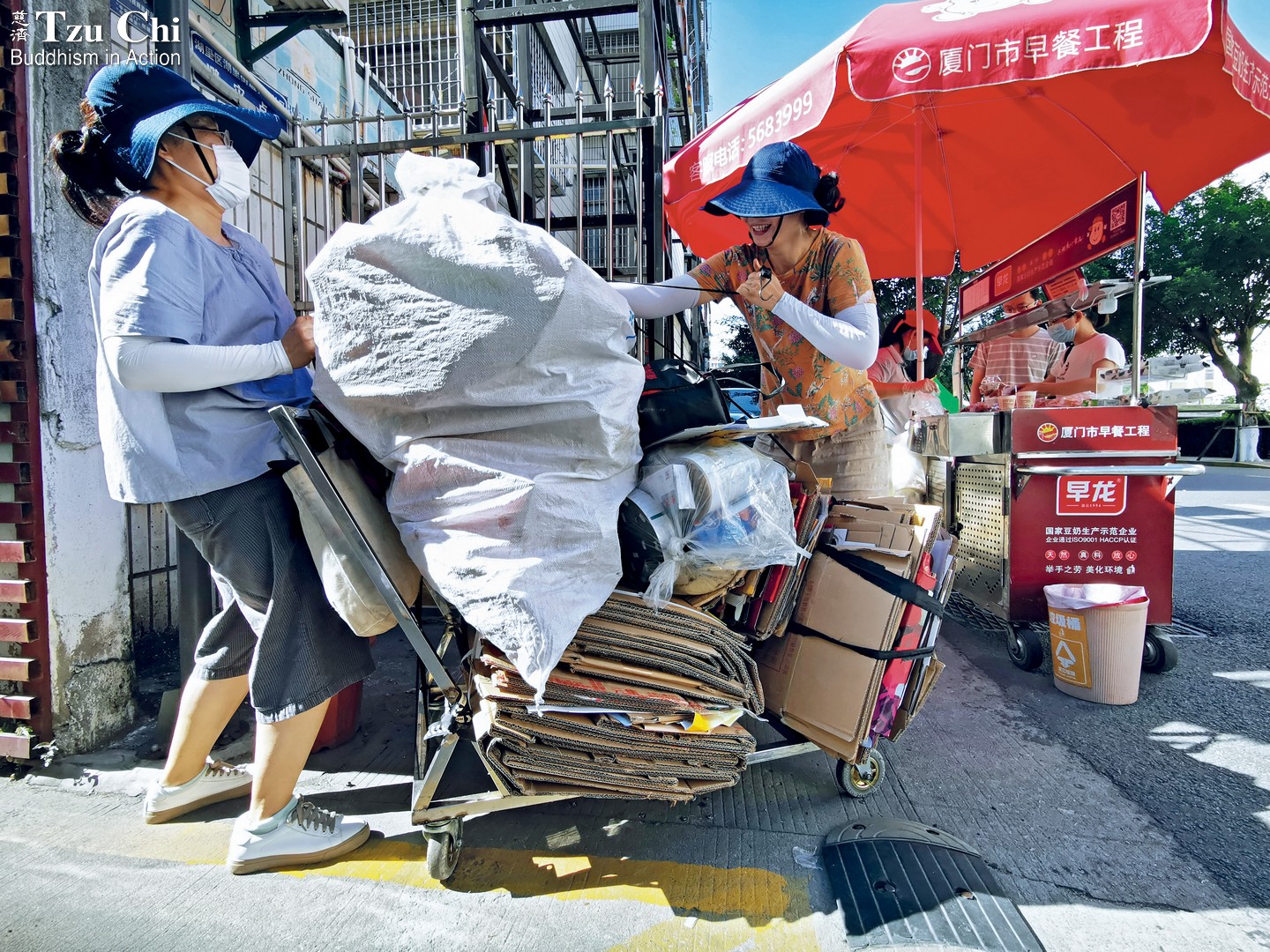
Promoting recycling at her stall
Listening to the Dharma talk seemed to fill Li with energy. As the day progressed, more people came to patronize her stall. She warmly tended to each one. She gave each customer only a single plastic bag to carry their purchases, no matter how much they bought. She explained to them that the fewer plastic bags are used, the better it is for the environment. She also explained the importance of recycling.
“One time I saw a Tzu Chi volunteer in Taiwan promoting recycling at her stall,” Li said. “That gave me the idea: why don’t I do the same?” Just like that, she started talking about environmental protection and doing recycling at work.
When a customer asked for a second plastic bag from her, Li patiently explained to him why she was limiting each customer to one bag: “Global warming is increasing the number and severity of natural disasters on the Earth. A plastic bag isn’t biodegradable. If we cut down how many we use and encourage others to do the same, we’ll help ease the pressure on the environment. It’d be great if you’d consider using fewer bags.”
Later, a secondary school student told Li he didn’t need a bag. Li’s eyes sparkled with joy when she heard that. She said to the teenager, “Attaboy! Be sure to spread the significance of environmental preservation to your schoolmates too.”
Among the community residents who came to buy food from Li’s stall, several brought her “gifts,” which they placed near her stall. They knew that this special breakfast vendor would put their love for the environment to good use. Li’s smile grew more radiant with each gift. She put her palms together and thanked each donor profusely.
An 80-year-old woman named Lin put a few used cardboard boxes near Li’s cart, quietly said to Li, “I have only these few for you today,” then turned to leave. But before she could walk away, Li grabbed her arm and responded in a chipper voice, “Ma’am, thank you so much! What matters is not the amount of recycling you bring, but your love for the Earth. You’ll have countless merits.” The old woman broke into a smile upon hearing such heart-warming words from Li.
Hu, another woman, stopped at Li’s stall when she saw what had just happened and asked curiously about the recyclables. Li is the happiest when something like this happens. She said to Hu: “If you bring your recycling here, we’ll sell it and use the money to help the needy. You can show your love for the Earth while helping needy people at the same time. The love in the world will grow more and more abundant if we all give of ourselves.” Hu said she really resonated with Li’s message, and promised to bring her recyclables to her stall in the future. They added each other on WeChat to facilitate further communication.
Li said appreciatively of the neighbors who had been bringing her their recycling: “They always tell me the recycling they bring me isn’t much. I tell them it’s okay—that many a little makes a mickle. Even just a bottle helps. The recycling from five or six families when put together is enough to make a small Mount Meru.” (In Buddhist cosmology, Mount Meru is the center of the universe and the abode of gods.)
Taking a moment when there were no customers to serve, Li donned a pair of gloves and organized the recyclables at her stall. She said she needed to get them ready to be taken away later. At around eight o’clock, a few neighbors arrived at Li’s cart. They’d come to take the recyclables to the nearest recycling point on their way to shop for groceries. On days when the amount of recycling is larger, Li posts a message to her group chat for recycling and nearby Tzu Chi volunteers come to haul the items away.
Li began cleaning up her breakfast cart at nine. Li, an elderly man in the community, had bought from her all the food items that hadn’t yet been sold. He does this every day. Li once asked the old man why he did this, and his answer really moved her. He said that he wanted her to be able to call it a day sooner so that she could have more time to do good—meaning her volunteer work for Tzu Chi.
Li’s 15-year-old son came to help her push the cart home. The mother and son closed the beach umbrella, then set out on their way home. They had to ascend an uphill stretch of road about 200 meters (0.1 mile) long to get home. It was a lot easier to negotiate the slope with her son’s help. “My husband gives me a hand on his days off too,” she said as a contented smile lit up her face. Li feels blessed to have her family behind her.
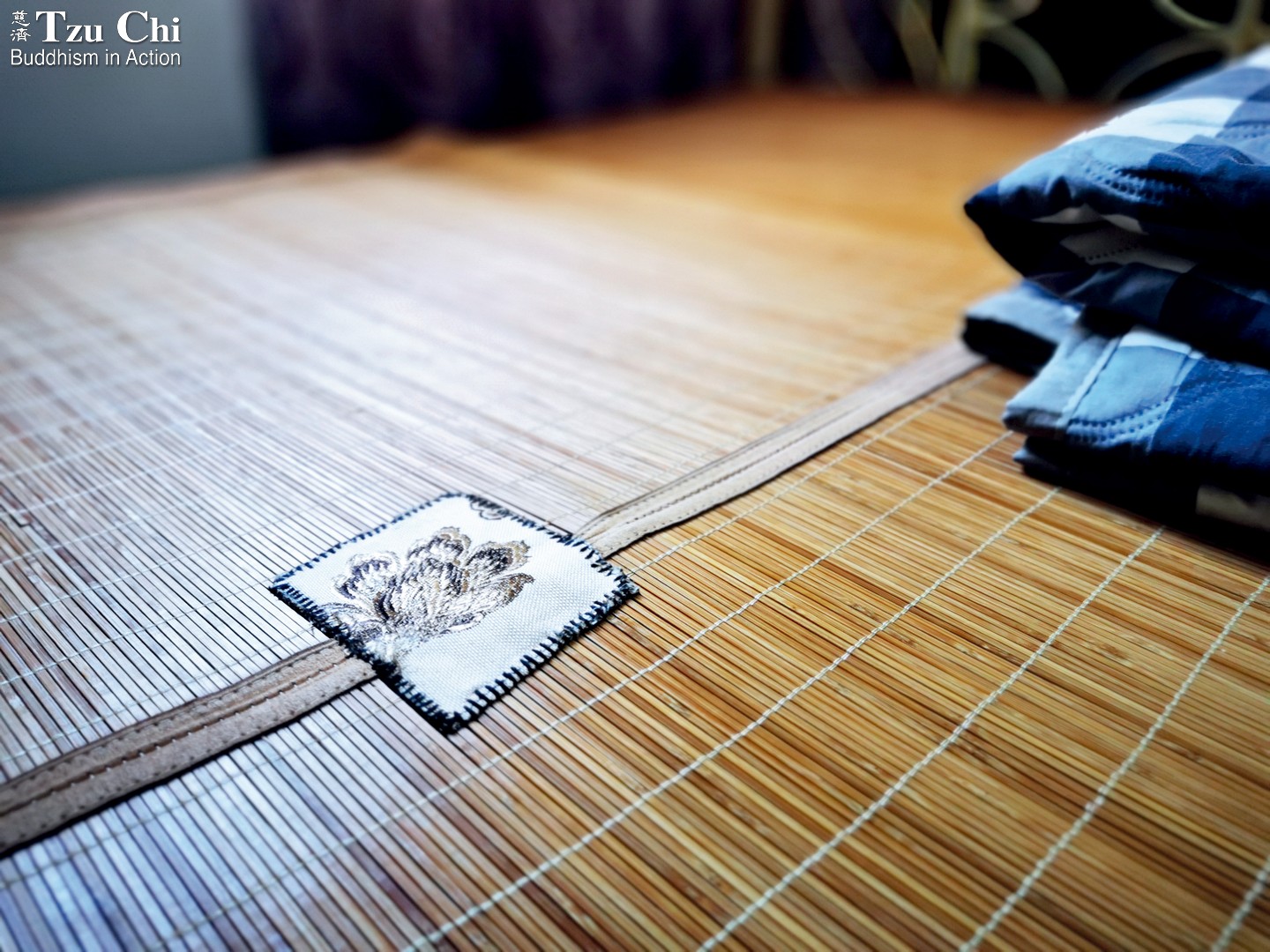
Li has learned to cherish the things she owns more since she took up recycling. This photo shows how Li patched a hole in a bamboo mat with a piece of embroidery.
People’s criticism about her recycling work hasn’t discouraged Li. She has stayed the course.
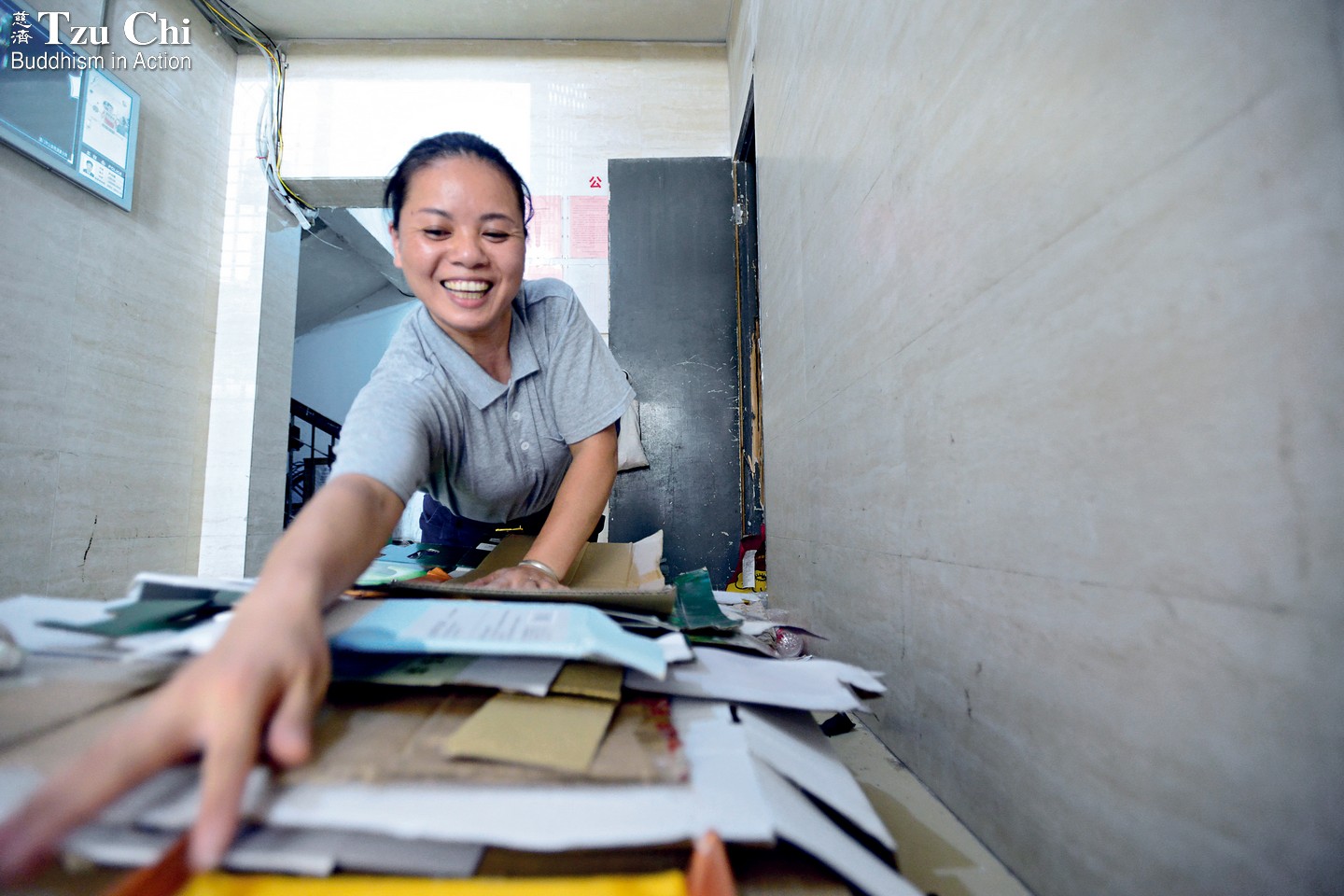
Once a shopaholic, now an environmentalist
If Tzu Chi volunteers hadn’t started promoting recycling in her community four years ago, Li would most likely still be chasing after money. She became passionate about making money when she was growing up due to her family’s strained financial situation. When she was 15, her younger brother was diagnosed with leukemia. Though her family spent all their savings paying for his treatment, they lost him in the end. After he passed away, Li left home and worked hard to make money to help support her family. She worked part time in several jobs at the same time, including in electronic and shoe factories.
She started running a breakfast stall when she got married and had her own child. The stall allowed her to be more flexible with her time. But after closing up her stall every day, she went to a supermarket and continued working as a salesperson. Her husband, Qian Baojun (錢保軍), worked several jobs too. Working hard like this eventually allowed them to buy a housing unit of their own in Xiamen.
Li kept her home spic and span. She had a special hobby: cleaning the floor. Before she joined Tzu Chi, she’d wash her home’s floor with bucket after bucket of water. She used so much water that even her husband, who is meticulous about cleanliness, nagged her. “You’re dumping one bucket after another nonstop. Do you think water is free?”
Li liked to shop online too. Even though the items she bought were not expensive, she bought so much that her closets were crammed full of her purchases.
But all that changed in 2016. Typhoon Meranti hit Xiamen in September that year, bringing such strong gales that trees were uprooted in Li’s community. Tzu Chi volunteers mobilized to help clear the trees and other debris away so that they wouldn’t block roads and affect traffic. The volunteers later even began promoting environmental preservation and recycling in the community. Inspired by their love for the environment, Li put on a volunteer vest and joined Tzu Chi’s recycling efforts. “Doing recycling work makes me sweat and is physically tiring, but I feel great and happy doing it,” said Li.
Despite being a neat freak, she followed the example of Tzu Chi volunteers and collected and sorted reusable garbage. “I felt awkward at first,” she admitted. “No matter how much I washed my hands when I returned home, I couldn’t seem to get them clean.” But she persisted, motivated by the dedication of other volunteers.
Her participation in Tzu Chi’s recycling work helped her realize the importance of conserving resources. For example, she stopped dumping bucket after bucket of water on the floor when she cleaned her home. She reflected on her consumption habits too. She felt remorseful about how she used to buy things she didn’t really need only to throw them away when she ran out of space. She felt especially bad when she realized that many people in the world suffer from starvation and that all the money she had squandered away could have been put to better use helping the needy. She stopped shopping at will, and even began wearing recycled clothes. Her husband teased her when he saw her wearing hand-me-downs from neighbors, but she didn’t mind. She also started helping sort second-hand clothes and giving them away to people in need.
Li is a very different person now. In addition to buying less, she tries to make every item she owns last as long as possible. When a hole was worn in a bamboo mat at her home, she patched it up with a piece of embroidery she made herself. “If I was acting the way I did before I became more aware,” she said, “I’d have tossed that mat out a long time ago.” Though the mat is patched, she thinks it’s still beautiful. “Like Master Cheng Yen says, ‘If we look at a chipped cup from another angle, it is still round.’”
Accumulating wealth is no longer a priority to her, but recycling is. In fact, it has become one of her favorite things to do. “A used bottle to others is just a used bottle, but in my eyes it is ten cents,” she said with a laugh. What is garbage to others is treasure to her—she says joy fills her heart when she sees a piece of trash she can pick up to recycle. She doesn’t mind getting all sweaty from doing recycling work. When she sweats, she feels she is getting rid of her inner impurities too.
Her temper has also improved since she joined Tzu Chi. Whenever she feels irritated because of something her husband does, she thinks of Master Cheng Yen’s teachings. The Master’s words of wisdom light up the dark corners of her heart like sunlight streaming into a dark room, and her anger dissipates.
Li’s family has felt her change too and supports her volunteering. Her husband used to give her sour looks when she picked up discarded drink bottles on the bus, but no more. He has even begun helping fix recycled broken electric appliances so that they can be given away to people who need such items.
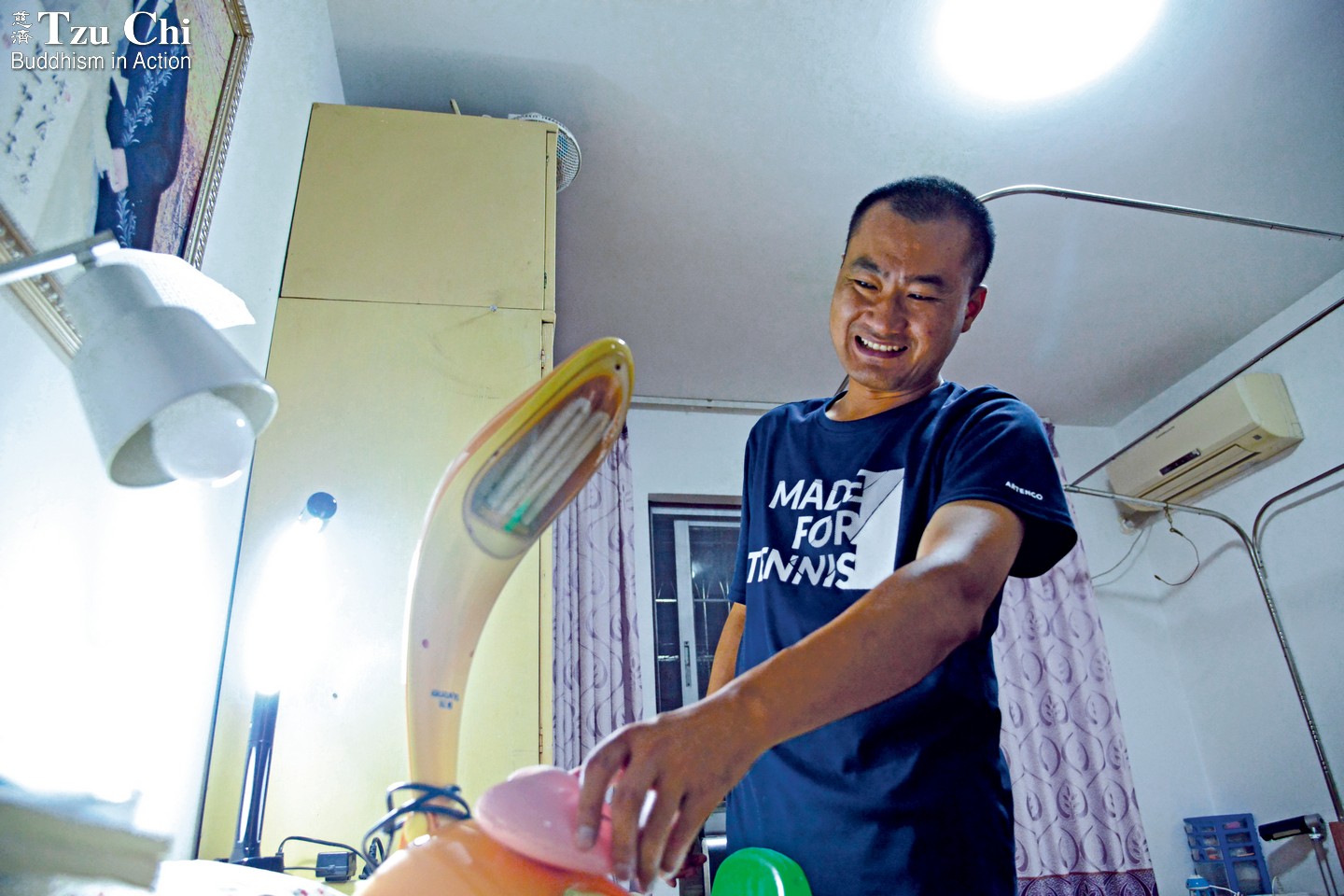
Li’s husband, Qian Baojun, fixes recycled broken appliances to give away to anyone who needs them.
A recycling room
When Li first took up recycling, she would often bring the garbage she had collected home. As the amount increased, her husband suggested that they talk to the company that managed their apartment building about letting them use an empty room on the first floor to store the recyclables. Li thought that was a good idea, but she had an even better one. She contacted the company and proposed setting up that empty room as a recycling point for their building. She felt that such a room could help increase awareness of environmental protection. “I was hoping I could get more neighbors to recycle their garbage and inspire their love for the Earth,” Li explained.
The property management company was impressed with Li’s idea and they saw that she would be using the room for a good cause. They agreed to let her use the room after she gave her word to keep the place clean.
Li kept her word. To keep the place clean and avoid clutter, she put a recycling bin at the door of the room. She wrote her cell phone number on the bin and specified the kinds of recyclable garbage that would be accepted. At first, many residents used the bin as a garbage can and put all kinds of trash in it—cigarette butts, kitchen waste, and so on. Some residents even denounced Li for collecting the recyclables to sell for her own profit. They said she was so hooked on money that she wasn’t beneath making money from garbage.
Li remained undaunted despite the gossip and hurtful remarks. She knew she could enlist the help of senior Tzu Chi volunteers to improve the situation, so she invited them to accompany her to visit her neighbors and share with them the environmental ideals that had pushed her to set up the room for recycling purposes. Li told new residents about the room when they moved in too. Her tireless efforts paid off. Now, out of the 54 households in the building, 51 bring their recycling to the room.
Volunteer Zhou Chunlan (周春蘭) lives in the same community as Li, and she often helps her clean up the room and put things in order. Zhou knows that “it was easy to set up the room, but hard to maintain it and keep it clean at all times.” To ensure its tidiness, Li checks the room four or five times a day, in the morning, at noon, in the evening, and before she goes to bed. Zhou tries to help ease her burden by giving her a hand.
Li’s hard work has won the hearts of many of her neighbors. One neighbor, Fan, said, “Li is doing a good thing. With her help, more garbage is being recycled, and the money from selling our recycling is used to aid the needy. Though there are differing opinions about the work she is doing, she has kept going and never become discouraged. Many of us [building residents] are touched when we see her working in the recycling room.”
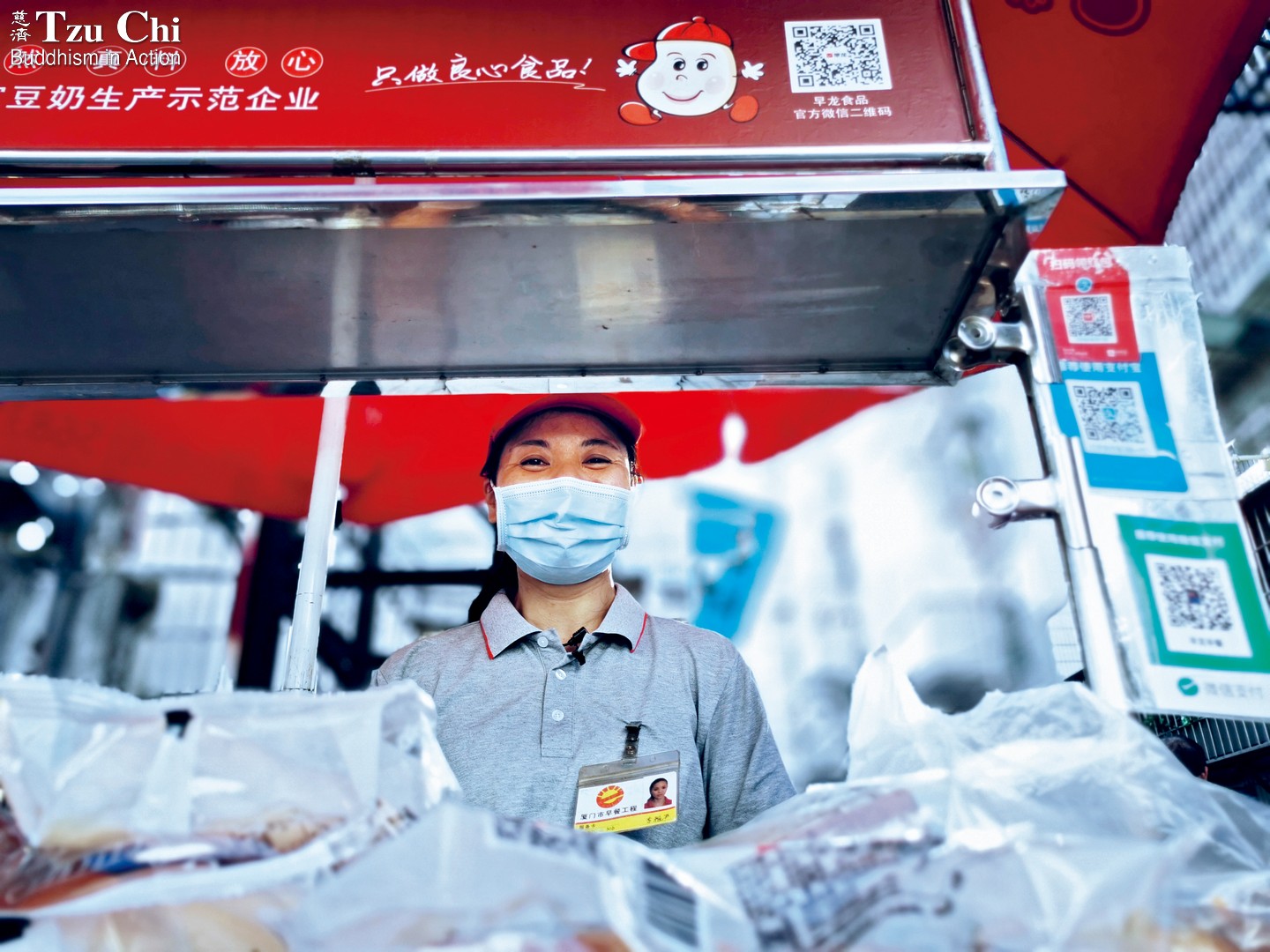
Li’s breakfast stall does more than provide breakfast—it is a place where she promotes recycling too.
Happy sweating for the Earth
In addition to managing the recycling room where she lives, Li pushes a hand truck around her neighborhood every day to collect recyclables at shops and homes. She does that after she closes up her stall for the day and puts things in order at the recycling room.
On this day, she grabbed a few burlap sacks and set out as usual with her hand truck for a collection trip around her community. Within an hour, she was back at her building, her truck laden with recyclables. Li was happy. “I’m making more money from recyclables than from selling breakfast!” she said cheerfully. “Look at all these items! The proceeds will allow us to help even more needy people.”
One shopkeeper told Li that he had some empty beer bottles for her, and he asked if she’d take them. Li readily agreed. Though glass bottles fetch little money, they are precious resources in her eyes. She is glad to help recycle anything that can be reused to ease the burden on the planet.
A community resident complimented Chen: “All her cells are alive with an environmental spirit. She’s getting better and better at promoting recycling. Even my young son knows to prepare the waste cardboard we have at home for her.” Li was delighted to have planted an environmental seed in a child and in another family.
Huang lives in the community next to Li’s. She took up recycling three years ago due to Li’s example. She has even set up a small recycling place similar to Li’s at her home. Li often visits her to help her sort recyclables. “If we don’t do a good job at recycling now,” said Huang, “our environment will deteriorate more and more. I used to sweat and toil to make a living; now I sweat and toil for the Earth. Working for the environment makes me very happy.” Hearing that, Li said with a smile, “Seeing how hard she is working, I dare not slack off at all.”
The bright smiles on their faces were like the sunflowers Li had placed at her stall—they gave people a lively sense of hope and optimism.



